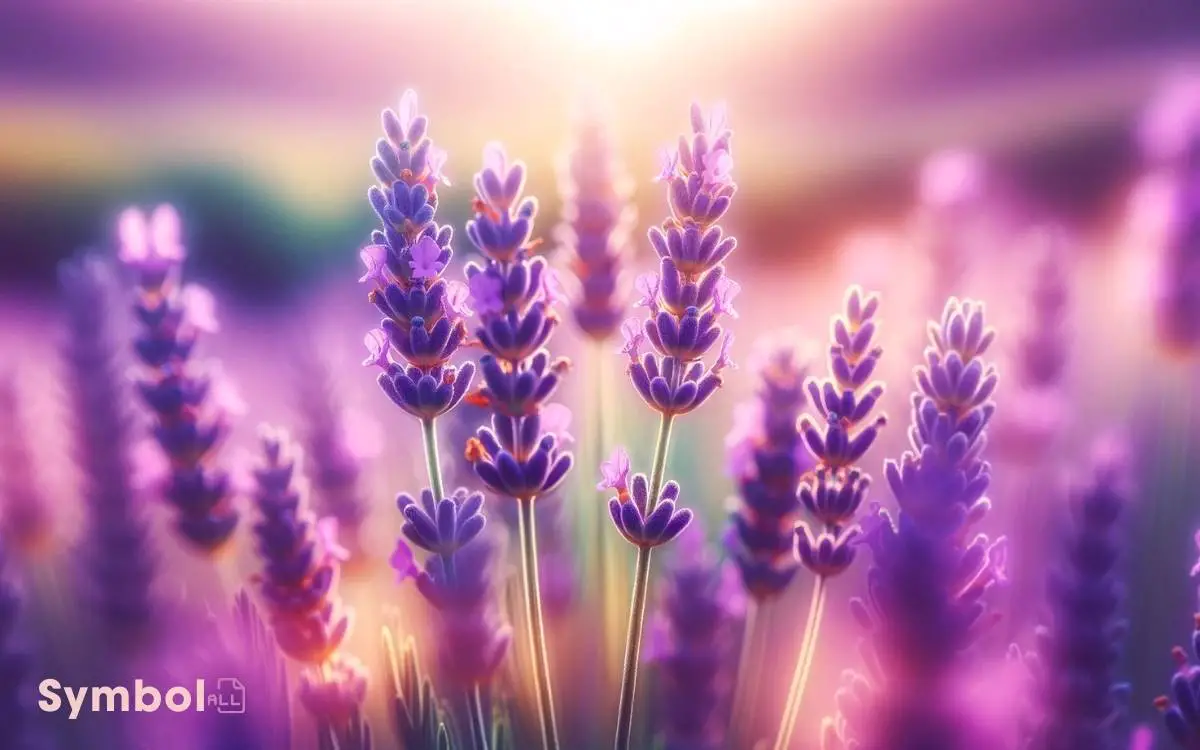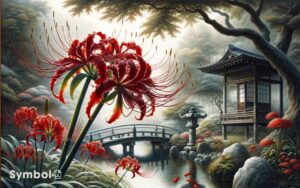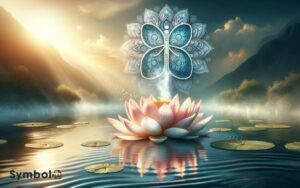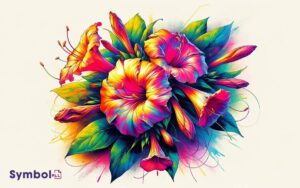What Does Lavender Flower Symbolize? Purity, Serenity!
Lavender symbolizes purity, serenity, and devotion, reflecting its ancient use in mummification, purification, and Roman rituals. It’s closely associated with innocence, modesty, and love, historically utilized in love spells.
Scientifically, lavender’s antibacterial and anti-inflammatory properties contribute to its symbolic cleansing. It reduces stress and anxiety, enhancing sleep quality and spiritual connection through compounds like linalool and linalyl acetate.
Lavender’s influence on the nervous system and mood-regulating neurotransmitters further supports its symbolism of calmness and inner peace.
Its role in cleansing negative energies and promoting focus in spiritual practices suggests a deeper exploration will reveal more on its multifaceted significance.

Key Takeaways
Historical Significance
Throughout history, lavender has played a pivotal role in various cultures due to its unique properties and symbolism. Its origins trace back to the ancient Mediterranean, Middle East, and India, where it was highly prized for its antiseptic and anti-inflammatory properties.
You’ll find that these civilizations utilized lavender in mummification processes and to purify homes and temples, embedding a deep historical significance in its use.
The Romans, especially, valued lavender for its healing and cleansing capabilities, using it extensively in their bathing rituals.
This widespread use across cultures not only underscores lavender’s versatility but also its enduring legacy in human history.
Its cultivation and application in traditional medicine, religious ceremonies, and daily life practices highlight lavender’s integral role in the historical tapestry of human civilization.
Purity and Innocence
You’ll find that lavender’s association with purity and innocence is deeply rooted in its symbolism of virginity.
Its essence, often perceived as embodying serenity, has been scientifically linked to its calming phytochemicals, reinforcing its role in rituals and traditions, especially in weddings.
These practices underscore lavender’s enduring representation of unblemished purity and tranquil innocence across various cultures.
Symbol of Virginity
In various cultures, lavender flowers symbolize virginity, representing purity and innocence due to their delicate appearance and soothing scent. This connection isn’t arbitrary but deeply embedded in the flower’s biological and aesthetic properties.
The color lavender itself, a soft purple, often denotes royalty and elegance but in a subdued manner that aligns with the virtues of modesty and chastity. Scientifically, lavender’s purity can be linked to its natural properties.
Lavandula, the genus to which lavender belongs, produces essential oils that have antiseptic qualities, metaphorically cleansing and preserving purity.
This biological function parallels the cultural symbolism of maintaining virginity as a state of untainted purity.
You’ll find that lavender’s emblematic association with virginity is a harmonious blend of its physical characteristics and historical perceptions, making it a powerful symbol across different contexts.
Essence of Serenity
Building on its symbolism of virginity, lavender embodies the essence of serenity through its purity and innocence. This is marked by a unique combination of soothing scents and visual appeal that promotes a sense of calm and peace.
Scientifically, lavender’s calming properties are attributed to its essential oils, which contain linalool and linalyl acetate. These compounds interact with the central nervous system to induce relaxation and diminish stress.
Additionally, the color lavender, a soft shade of purple, is often associated with tranquility and spiritual healing.
This connection isn’t merely aesthetic; psychological studies suggest that certain colors can influence mood and perception, with lavender’s hue particularly effective in fostering an environment of serenity.
Hence, its presence in spaces is strategically utilized to cultivate a tranquil atmosphere, reinforcing its symbolic representation of purity and innocence.
Traditions in Weddings
Lavender’s role in wedding traditions reflects its enduring symbolism of purity and innocence, deeply rooted in cultural practices and beliefs. You’ll find its delicate presence woven into various aspects of matrimonial ceremonies, from bouquets to decor.
Scientifically, Lavandula (lavender) embodies attributes that transcend mere aesthetic appeal. Its calming scent is believed to reduce stress, a valuable quality amidst the bustling atmosphere of weddings.
Analytically, incorporating lavender into weddings serves a dual purpose. It not only enhances the visual and olfactory ambiance but also symbolically purifies the union, echoing ancient customs where purity and innocence were paramount.
Hence, its inclusion in wedding traditions isn’t merely decorative but a deliberate nod to these deeply ingrained cultural values.
Calmness and Serenity
Lavender flowers symbolize calmness and serenity, primarily due to their soothing fragrance that has been scientifically proven to reduce stress and anxiety levels in humans.
This connection isn’t merely anecdotal; it’s backed by research showing how lavender can notably impact our nervous system, promoting relaxation and peace.
Here’s a closer look at the science:
- Linalool, a component of lavender scent, acts directly on the brain’s receptors to decrease agitation.
- Studies demonstrate decreased cortisol levels, the stress hormone, after inhaling lavender oil.
- Enhanced sleep quality has been observed with lavender use, highlighting its role in promoting overall tranquility.
Understanding these effects explains why lavender is so deeply associated with calmness and serenity, offering a natural, holistic approach to managing everyday stress.
Love and Devotion
Beyond its calming effects, lavender also embodies symbols of love and devotion, with its vibrant hues and enduring fragrance playing a key role in expressing heartfelt emotions.
Historically, lavender’s use in love spells and potions underscores its association with deep affection and unwavering commitment.
Analytically, the plant’s resilience and ability to thrive in harsh conditions metaphorically parallel the enduring nature of love.
Cultivation studies reveal that lavender’s essential oils, responsible for its distinct aroma, can stimulate the brain’s limbic system, enhancing emotional well-being and fostering connections.
This biochemical interaction suggests lavender’s capacity to deepen bonds between individuals, reinforcing its symbolic representation of love and devotion. Therefore, lavender transcends mere aesthetic appeal, embodying complex emotional and biochemical dimensions of love.
Healing Properties
Renowned for its therapeutic benefits, lavender plays an essential role in promoting physical and mental health through its anti-inflammatory and soothing properties. Its compounds, such as linalool and linalyl acetate, contribute to its efficacy in healing.
- Antibacterial Activity: Lavender oil has been scientifically proven to fight off bacterial infections, making it effective in treating skin conditions and wound healing.
- Anxiety and Stress Reduction: Research indicates that inhaling lavender scent can notably decrease levels of stress and anxiety, promoting a sense of calm and well-being.
- Sleep Improvement: Studies show that lavender can enhance the quality of sleep by increasing the duration and reducing nighttime awakenings, making it beneficial for those suffering from insomnia.
Harnessing these properties, lavender serves as a powerful tool in enhancing one’s health regimen.
Spiritual Connections
You’ll find that lavender flowers play a vital role in enhancing spiritual awareness by stimulating the brain’s olfactory pathways, which are directly connected to the emotional center.
Their scent promotes inner peace by greatly reducing stress markers in the body, such as cortisol levels, according to recent studies.
Additionally, lavender has been shown to cleanse negative energies, proven by its ability to purify air from harmful bacteria and viruses, thereby creating a more harmonious environment for spiritual practices.
Enhancing Spiritual Awareness
Lavender flowers serve as a potent symbol for enhancing spiritual awareness, bridging the gap between the physical and the transcendental domains.
This connection isn’t just folklore but is deeply rooted in the physiological effects lavender has on the human body, which in turn influences spiritual practices.
- Neurological Influence: Lavender’s scent has been scientifically proven to modulate brain activity, specifically in areas linked with emotions and the nervous system, facilitating a deeper spiritual connection.
- Stress Reduction: By markedly lowering stress levels, lavender creates an environment conducive to meditation and spiritual reflection.
- Ritualistic Use: Historically, lavender has been incorporated into numerous spiritual rituals to purify and prepare sacred spaces, enhancing the individual’s focus on spiritual matters.
Understanding these aspects can deepen your appreciation for lavender’s role in spiritual practices.
Promoting Inner Peace
Building on its role in enhancing spiritual awareness, lavender also significantly contributes to promoting inner peace by acting on the central nervous system to induce a state of calm and equilibrium.
Its aromatic molecules, once inhaled, enter the bloodstream and interact with the limbic system, the brain’s emotional powerhouse.
This interaction triggers the release of neurotransmitters like serotonin and dopamine, which are vital for mood regulation and stress reduction.
Additionally, lavender’s influence extends to lowering the heart rate and reducing blood pressure, further facilitating a state of relaxation.
This biochemical pathway elucidates how lavender fosters a serene mental environment, allowing you to connect more deeply with your inner self and the surrounding universe, grounding you firmly in the present moment.
Cleansing Negative Energies
How does lavender facilitate the cleansing of negative energies from our personal spaces and spiritual selves?
Lavender’s unique properties interact with our environment and psyche in a multifaceted approach.
- Chemical Composition: Lavender’s essential oils contain compounds like linalool and linalyl acetate, which have been scientifically proven to reduce anxiety and stress, fostering a more positive atmosphere.
- Aromatic Influence: The scent of lavender directly affects the limbic system, the brain’s emotional powerhouse, helping to clear negative thoughts and emotions.
- Historical Use in Rituals: Lavender has been traditionally used in cleansing rituals and smudging practices to purify spaces and attract positive energies, supported by its antibacterial and antiviral properties.
Cultural Interpretations
Throughout history, cultures worldwide have imbued lavender flowers with various symbolic meanings, reflecting their beliefs, traditions, and societal values.
Analyzing these interpretations reveals a fascinating tapestry of symbolism that transcends geographical boundaries yet exhibits unique cultural nuances.
| Culture | Symbolism |
|---|---|
| Ancient Rome | Cleansing and purity |
| Victorian Era | Silence and devotion |
| France | Love and affection |
| Japan | Elegance and refinement |
In ancient Rome, lavender was associated with cleanliness, owing to its use in baths. The Victorian era saw it as a sign of silence and devotion, often used in secret love messages.
In France, it symbolizes love and affection, whereas, in Japan, it represents elegance and refinement. These varied interpretations underscore lavender’s multifaceted symbolism, deeply embedded in cultural contexts.
Conclusion
In the tapestry of human history, you’ve seen how the lavender flower weaves a rich narrative, embodying purity, calm, and love. Its petals, more than mere molecules, are imbued with the power to soothe the soul and mend the heart.
Like the mythical Phoenix rising from ashes, the lavender symbolizes rebirth through its healing essence. Across cultures, its significance transcends mere folklore, anchoring deeply in our collective psyche.
Lavender isn’t just flora; it’s a demonstration of resilience and eternal hope.






